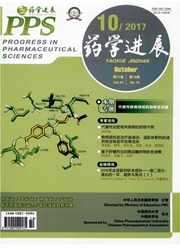

 中文摘要:
中文摘要:
哺乳动物雷帕霉素靶蛋白(mTOR)是PI3K/Akt/mTOR等多种信号通路的下游分子,在细胞增殖、分化、转移和存活中发挥重要作用,已成为癌症治疗的一个重要靶标。传统的mTOR抑制剂主要是雷帕霉素及其衍生物,能特异性抑制mTORC1,但在部分癌症临床治疗中未达到预期疗效,且易产生耐药性。第二代mTOR抑制剂即双重或多重mTOR抑制剂能与mTOR的催化位点竞争ATP,高度选择性地抑制mTORC1和mTORC2,比单靶点mTOR抑制剂具有更大的治疗优势。此外,某些天然来源产物也具有对mTOR的抑制作用,且毒性、副作用更小。综述近几年有关mTOR及其抑制剂在抗肿瘤方面的研究进展。
 英文摘要:
英文摘要:
As a downstream molecule of various pathways such as PI3K/Akt/mTOR pathway, mTOR plays important roles in cell proliferation, differentiation, metastasis and survival, emerging as a key protein target of anticancer drugs. Traditional mTOR inhibitors, rapamycin and its analogs, can effectively inhibit mTORC1, but suffer from limited clinical efficacy and easy development of drug resistance. The second generation mTOR inhibitors are dual or multiple mTOR inhibitors that can compete with the catalytic site of mTOR for ATP and inhibit both mTORC1 and mTORC2 with a high selectivity, showing advantages over single inhibitors. Furthermore, some natural compounds have been found to inhibit mTOR with low toxicity and less side effects. In this paper, we reviewed the latest research in mTOR and its inhibitors as anticancer drugs.
 同期刊论文项目
同期刊论文项目
 同项目期刊论文
同项目期刊论文
 Bioactive tanshinones in Salvia miltiorrhiza inhibit the growth of prostate cancer cells in vitro an
Bioactive tanshinones in Salvia miltiorrhiza inhibit the growth of prostate cancer cells in vitro an Cryptotanshinone has diverse effects on cell cycle events in melanoma cell lines with different meta
Cryptotanshinone has diverse effects on cell cycle events in melanoma cell lines with different meta Xanthatin induces cell cycle arrest at G2/M checkpoint and apoptosis via disrupting NF-κB pathway in
Xanthatin induces cell cycle arrest at G2/M checkpoint and apoptosis via disrupting NF-κB pathway in Comparative Effects of Hirudo, Frankincense, and Motherwort on Inhibition of Blood Platelet Aggregat
Comparative Effects of Hirudo, Frankincense, and Motherwort on Inhibition of Blood Platelet Aggregat Luteolin reduces the invasive potential of malignant melanoma cells by targeting β3 integrin and the
Luteolin reduces the invasive potential of malignant melanoma cells by targeting β3 integrin and the Inhibition of hypoxia-induced epithelial mesenchymal transition by luteolin in non-small cell lung c
Inhibition of hypoxia-induced epithelial mesenchymal transition by luteolin in non-small cell lung c Effect of Aqueous Extracts of Several Kinds of Herbs on Human Platelet Aggregation and Expression of
Effect of Aqueous Extracts of Several Kinds of Herbs on Human Platelet Aggregation and Expression of Chemomodulatory effi cacy of lycopene on antioxidant enzymes and carcinogen-induced cutaneum carcino
Chemomodulatory effi cacy of lycopene on antioxidant enzymes and carcinogen-induced cutaneum carcino Holothurian glycosaminoglycan inhibits metastasis and thrombosis via targeting of nuclear factor-kap
Holothurian glycosaminoglycan inhibits metastasis and thrombosis via targeting of nuclear factor-kap Inhibition of vascular endothelial growth factor-mediated angiogenesis involved in reproductive toxi
Inhibition of vascular endothelial growth factor-mediated angiogenesis involved in reproductive toxi Holothurian Glycosaminoglycan Inhibits Metastasis and Thrombosis viaTargeting of Nuclear Factor-κB/T
Holothurian Glycosaminoglycan Inhibits Metastasis and Thrombosis viaTargeting of Nuclear Factor-κB/T Concerted Suppressionof STAT3 and GSK3β Is Involved in Growth Inhibition of Non-Small Cell LungCance
Concerted Suppressionof STAT3 and GSK3β Is Involved in Growth Inhibition of Non-Small Cell LungCance CryptotanshinoneActivates p38/JNK and Inhibits Erk1/2 Leading to Caspase-Independent Cell Deathin Tu
CryptotanshinoneActivates p38/JNK and Inhibits Erk1/2 Leading to Caspase-Independent Cell Deathin Tu Luteolin reduces theinvasive potential of malignant melanoma cells by targeting β3 integrin and thee
Luteolin reduces theinvasive potential of malignant melanoma cells by targeting β3 integrin and thee Inhibition of hypoxia-induced epithelialmesenchymal transition by luteolin in non-small cell lung ca
Inhibition of hypoxia-induced epithelialmesenchymal transition by luteolin in non-small cell lung ca The Angiogenic Responses Induced by Release of AngiogenicProteins from Tumor Cell-Activated Platelet
The Angiogenic Responses Induced by Release of AngiogenicProteins from Tumor Cell-Activated Platelet Cryptotanshinone, a novel tumor angiogenesisinhibitor, destabilizes tumor necrosis factor-a mRNA via
Cryptotanshinone, a novel tumor angiogenesisinhibitor, destabilizes tumor necrosis factor-a mRNA via Chemopreventive efficacy of menthol on carcinogen-induced cutaneous carcinoma in mice throughinhibit
Chemopreventive efficacy of menthol on carcinogen-induced cutaneous carcinoma in mice throughinhibit Cancer-promotingeffect of capsaicin on DMBA/TPA-induced skin tumorigenesis by modulatinginflammation
Cancer-promotingeffect of capsaicin on DMBA/TPA-induced skin tumorigenesis by modulatinginflammation Holothurian glycosaminoglycan inhibits metastasis via inhibition of P-selectin in B16F10 melanoma ce
Holothurian glycosaminoglycan inhibits metastasis via inhibition of P-selectin in B16F10 melanoma ce PKM2 Regulates Hepatocellular Carcinoma Cell Epithelial-mesenchymal Transition and Migration upon EG
PKM2 Regulates Hepatocellular Carcinoma Cell Epithelial-mesenchymal Transition and Migration upon EG PKM2 Regulates Hepatocellular Carcinoma Cell Epithelialmesenchymal Transition and Migration upon EGF
PKM2 Regulates Hepatocellular Carcinoma Cell Epithelialmesenchymal Transition and Migration upon EGF Phenolcarboxylic acids from medicinal herbs exert anticancer effects through disruption of COX-2 act
Phenolcarboxylic acids from medicinal herbs exert anticancer effects through disruption of COX-2 act 期刊信息
期刊信息
